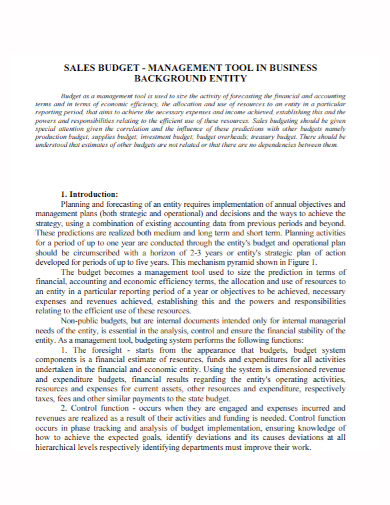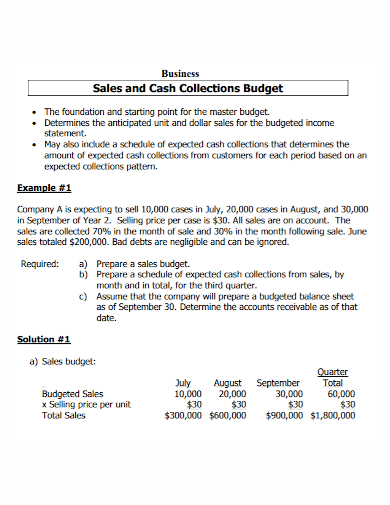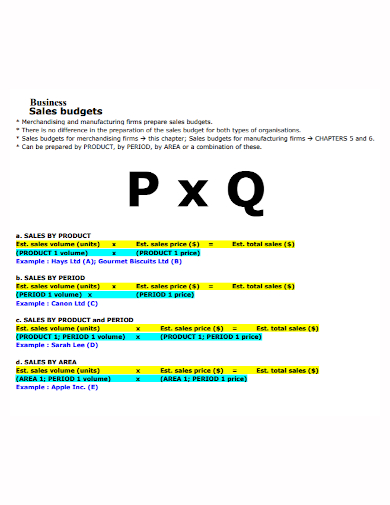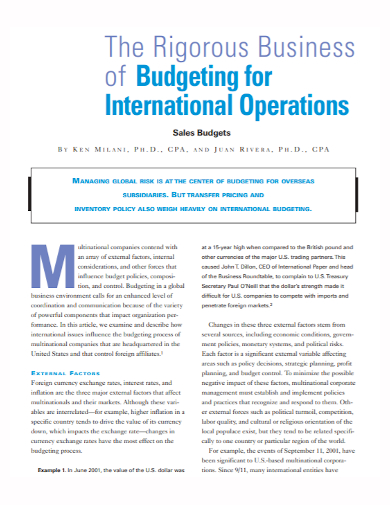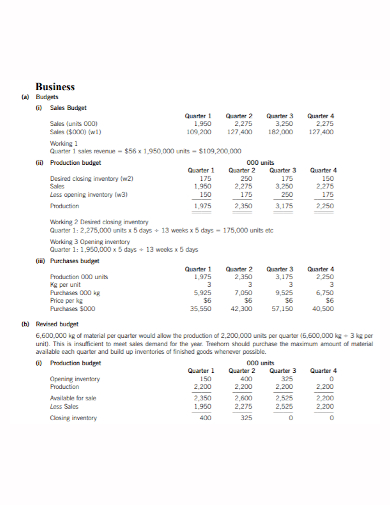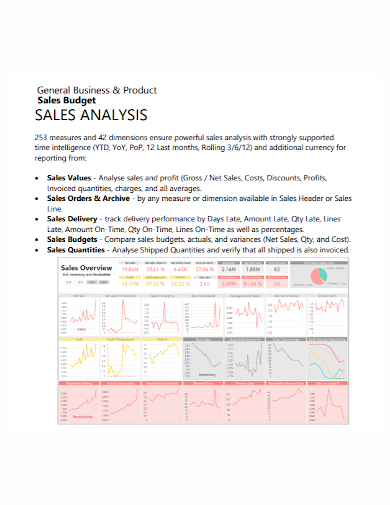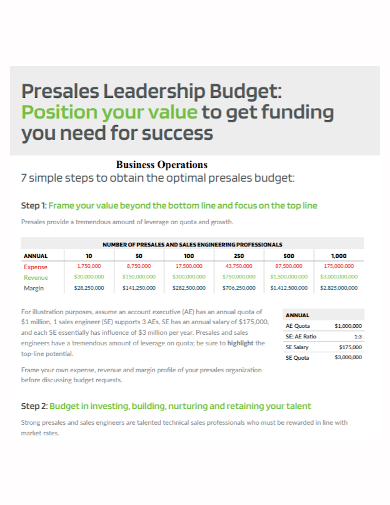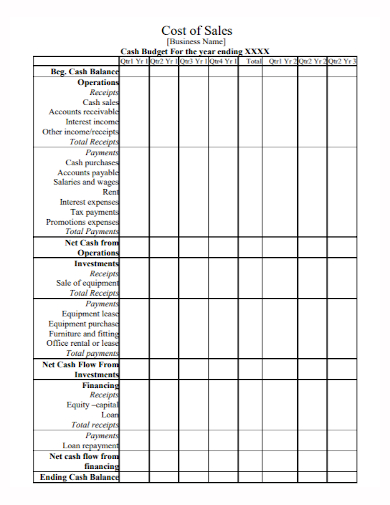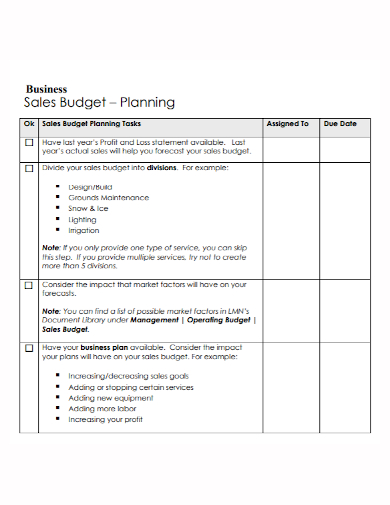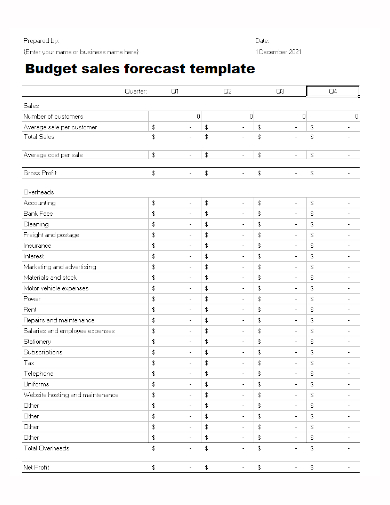Many other important business decisions affecting your sales team and your company as a whole are influenced by an effective sales budget. Everything from fine-tuning sales processes to determine how many new sales representatives to hire, and everything in between. Your sales budget is critical to keeping your business profitable, especially during lean times when every penny counts. The sales budget (and the process of developing one) serves as a road map for your company and its sales team for the rest of the month, quarter, and year. The more precise your sales budget, the more effectively you can manage your company.
10+ Business Sales Budget Samples
What does your sales budget determine, specifically? Simply put, a sales budget is a forecast of your total expected sales revenue over a given time period. This is done by multiplying the expected number of units sold by the selling price. Several other factors, such as your previous sales data and current market trends, are critical components of the sales budgeting process. These will assist you in determining an accurate estimate of the number of units expected to be sold during the budget period. When it comes to budgeting and financial forecasting, the sales budget is often the first step. Most of your company’s other budgets will benefit from the revenue numbers from your sales budget. Remember that, while sales budgets are an important part of your company’s master budget, they typically do not include the costs of conducting sales efforts.
1. Business Sales Budget Template
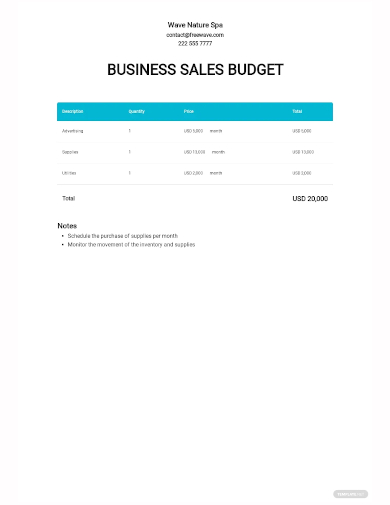
2. Business Management Sales Budget
3. Business Sales Cash Budget
4. Business Sales Budget
5. Business Sales Operation Budget
6. Business Sales Production Budget
7. Business Sales Analysis Budget
8. Leadership Business Sales Budget
9. Business Sales Cost Budget
10. Business Sales Planning Budget
11. Business Sales Forecast Budget
Preparing Your Sales Budget
- Select a period intended for the budget – The first thing you’ll do is choose the time period for your budget. Sales budgets are typically set up as a quarterly budget with an annual total, but they can also be set up as an annual budget in its entirety.
- Gather the sales price – Have a list of your current selling prices for each unit or service. You’ll need the current selling price for each of your products or services if you have more than one. Have those new prices on hand as well if your company plans to change any sales prices later in the year (due to increased demand, anticipated increases in the cost of materials, etc.).
- Pull the historical sales data – If you’ve been in business for a while, this is the place to start when putting together a sales budget. Make sure you collect sales data from the same time period as your budget. Find and import this information into your sales CRM. Most CRMs now make it simple to get these figures quickly. If you’re making an annual budget, use sales data from the previous year as a starting point. Pull sales data from the same quarter last year if you’re making a quarterly budget, and so on.
- Look at industry benchmarks – Of course, if this is your first year in business, you won’t have any historical sales data to work with. Looking at sales benchmarks in your industry is the next best place to start. On the internet, you can find benchmarks and sales data for public companies. Using recent industry benchmarks can help you create a more accurate sales budget, whether you’re a new company or not.
- Factor in the market trends – Past sales figures will serve as a good starting point for your sales budget. However, past performance does not always predict future outcomes. As a result, when preparing your budget, you should consider current market trends in your industry. Whether your industry’s sales are increasing or decreasing, you should account for any current trends in your sales budget. Another market trend to consider is increased competitor saturation this year versus last year, which may result in a slight drop in sales, even if only temporarily.
- Take into account the size of your sales team – Examine how many sales reps your team is working with as the budget period approaches. When you compare this number to previous sales periods, you’ll notice a significant difference. You may not have as many total sales if you have significantly fewer salespeople now. Alternatively, if you’ve recently hired more new salespeople, you’ll likely see an increase in sales. As a result, when planning your sales budget, adjust your estimated sales figures accordingly.
FAQs
Why do you have to communicate with your customers?
When it comes to your sales budget, your customers are also a great resource. Customers who have been with you for a long time. In comparison to the previous year, what they intend to spend on your products or services in the coming year is a good predictor of future sales.
When is a budget reviewed?
Budgets are frequently reviewed on the same timeline because they are typically published monthly, quarterly, and/or yearly. They may, however, pass through several departments and sets of eyes to ensure accuracy.
What is the goal of a sales budget?
The goal of a sales budget is to direct or control the actions of sales managers in response to variables that arise as a result of the sales budget. Budgets are used as a benchmark against which the team’s performance is measured. Sales managers can identify areas of expenditure that can be improved through corrective action by analyzing sales budgets for variance.
If you want to see more samples and formats, check out some business sales budget samples and templates provided in the article for your reference.
Related Posts
FREE 10+ Expense Budget Samples in MS Word | Google Docs | Google Sheets | MS Excel | PDF
FREE 4+ Vacation Budget Planner Samples in PDF
FREE 10+ Budget Outline Samples in PDF | MS Word
FREE 10+ Conference Budget Samples in MS Word | MS Excel | Google Docs | Google Sheets | Apple Pages | PDF
FREE 10+ Monthly Budget Worksheet Samples in PDF | MS Word | Google Docs | Google Sheets | Excel
FREE 10+ Monthly Project Budget Samples in MS Word | MS Excel | Google Docs | Google Sheets | PDF
FREE 10+ Corporate Budget Samples in MS Word | MS Excel | Google Docs | Google Sheets | PDF
FREE 9+ Primary School Budget Samples in MS Word | Google Docs | Google Sheets | MS Excel | PDF
FREE 10+ Operational Budget Samples in PDF | DOC
FREE 5+ Budget Layout Samples in PDF
FREE 6+ Paycheck Budget Samples in PDF | MS Word
FREE 10+ Architecture Budget Samples in PDF
FREE 10+ Capital Budget Samples in PDF | MS Word | Google Docs | Google Sheets | Excel | Apple Numbers | Apple Pages
FREE 10+ Budget Tracker Samples in PDF | DOC
FREE 4+ Corporate Monthly Budget Samples in MS Word | Google Docs | Google Sheets | Excel

